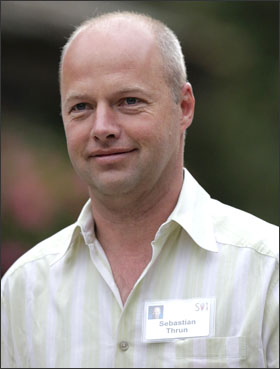‘MOOCs’ Pioneer Says Massive Open E-Courses Falling Short
The world of “MOOCs” is, in the language of so many of those classes’ adherents, being disrupted. And that disruption is coming from within.
Sebastian Thrun, the colorful academic and entrepreneur who in many ways has become the public face of “massive open online courses,” is now expressing dismay with the low numbers of students completing those courses, and with the forum’s inability to engage and help college students.
And that’s not all. In a profile published by Fast Company, Thrun cites those lackluster results as the reason he will shift the focus of the MOOC provider he co-founded, Udacity, to concentrate on corporate training, rather than higher education. The author of the story, Max Chafkin, describes the change as one that “involves charging money for classes and abandoning academic disciplines in favor of more vocational-focused learning.”
This amounts to a big public departure for Thrun, who has received a ton of attention for his bold predictions about how MOOCs would force colleges to change how they do business by giving the public free or low-cost access to web-based courses on a broad variety of topics.
“I’d aspired to give people a profound education—to teach them something substantial,” Thrun said in the story. “But the data was at odds with this idea.”
He later added: “We were on the front pages of newspapers and magazines, and at the same time, I was realizing, we don’t educate people as others wished. We have a lousy product…It was a painful moment.”
His comments have unleashed a strong reaction from online commentators. Some are saying Thrun’s turnabout was predictable, given the overhyped promises associated with MOOCs. Other are saying its nothing to be optimistic or encouraged about, while still others are viewing his shift as part of a natural, if rocky, evolution as the promises and failings of the online courses get sorted out.

Udacity uses a variety of technological tools to try to keep its MOOC audiences engaged, including quizzes and measures of progress. But problems keeping students on board have persisted, noted Thrun, who describes his humbling experience of having personally developed a statistics course, only to see it struggle in many of the same ways as other MOOCs.
Those shortcomings were also evident in a high-profile effort to use MOOCs to help students at San Jose State University with remedial math. Student persistence in sticking out the course was relatively strong, but passing rates were low.
Those experiences, Thrun said, helped convince him to focus more on corporate training. As described in the story, Udacity is working with companies to develop online training classes, with those who complete that work receiving certificates showing job-readiness.
The company is not abandoning higher education. The story describes a partnership with the Georgia Institute of Technology, in which the institution and Udacity will offer classes at a cost for an online master’s degree program. Expenses for the program are being covered by AT&T, which aims to get access to talented engineers.
What are the implications of Udacity’s shift for K-12, where efforts to establish MOOCs are in their relative infancy?
In one sense, MOOCs in K-12 are already focused on workplace skills. Another MOOC provider, Coursera, earlier this year announced a series of partnerships with universities to provide open courses targeting teachers who are trying to improve their skills, and aspiring educators working to get into the teaching profession. To date, those courses have been described as not being offered for academic credit.
Whether Udacity’s shift will lead to an even greater focus on the “vocational” training that goes into teaching remains to be seen.
Photo of Sebastian Thrun taken earlier this year at the Allen & Company Sun Valley Conference in Idaho, by Rick Bowmer/AP-File.
